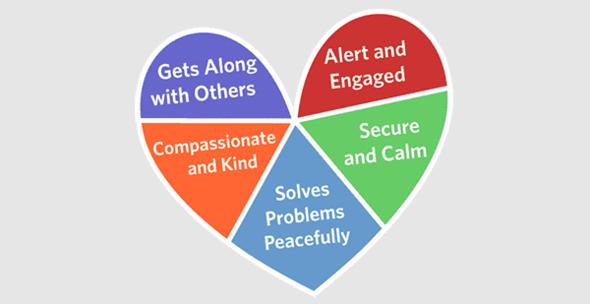Heart-Mind Index

SIGNIFICANCE OF HEART-MIND WELL-BEING
- Children who develop social and emotional skills have better attitudes about themselves and others, and better social interactions.
- Children with strong social and emotional skills are less aggressive, can handle difficult emotions, and they have lower levels of emotional distress.
- Students who receive Social and Emotional Learning (SEL) instruction improve an average 11 percentile points on standardized achievement tests compared to students who do not receive such instruction.
- We can successfully create conditions in schools, communities and families that build the capacity of children to recognize their emotions, to understand and empathize with others, and to make constructive choices.
- We can foster positive human qualities such as compassion, empathy and confidence, and we can help children manage difficult emotions such as fear, hatred, anger, and anxiety.
FIVE DOMAINS OF HEART-MIND WELL-BEING

The Index measures Heart-Mind well-being according to five positive human qualities, which are anchored in evidence-based research related to the social and emotional development of children.
GETS ALONG WITH OTHERS - the ability to form positive and healthy relationships with peers and adults.
COMPASSIONATE AND KIND - the ability to be aware of other people's emotions and a desire to help when a person is in need.
SOLVES PROBLEMS PEACEFULLY - the ability to behave in a peaceful and respectful way in a variety of situations and relationships.
SECURE AND CALM - the ability to take part in daily activities and approach new situations without being overwhelmed with worries, sadness or anxiety.
ALERT AND ENGAGED - the ability to stay calm, focused and alert; to demonstrate self-control and to slow down and think before acting.
NEIGHBOURHOOD MAPS
Using the HMI data, the Dalai Lama Center and HELP are developing maps of neighbourhoods throughout the province which reflect the domains of heart-mind well-being.
COMMUNITY CONSULTATION
The HMi Has been presented to selected communities in the Lower Mainland and on Vancouver Island with overwhelming support for the concept of Heart-Mind well-being and for the importance of focusing on the social and emotional development of children. There has been general agreement that the Index is essential to shine a light on issues of social and emotional development and provide concrete data about children's well-being from which decisions can be made about policy, programs, and allocation of resources.
GUIDING ACTION
HMI offers valuable information to help monitor the impact of programs and policies designed to improve the Heart-Mind well-being of children in their early years. It allows community members and policy makers to focus their learning and action on the most effective interventions to address specific challenges in their communities. It can also support communities, educators, governments, and health professionals to make evidence-based decisions. The Index has the potential to act as a stimulant toward improving the social and emotional well-being of children in BC.
NEXT STEPS
Based on the outcomes of community consultations, a strategy for the wide-spread release of the Index for community use is being developed. Written and online resources are being created to provide communities with neighbourhood-specific Heart-Mind Index data and access to an in-depth repository of research information about the five domains of the HMI and practical guidance on how to use it. The strategy will also involve facilitated community training and support to help communities understand their Heart-Mind Index data, and to turn the information into actions that will improve the well-being of children.
